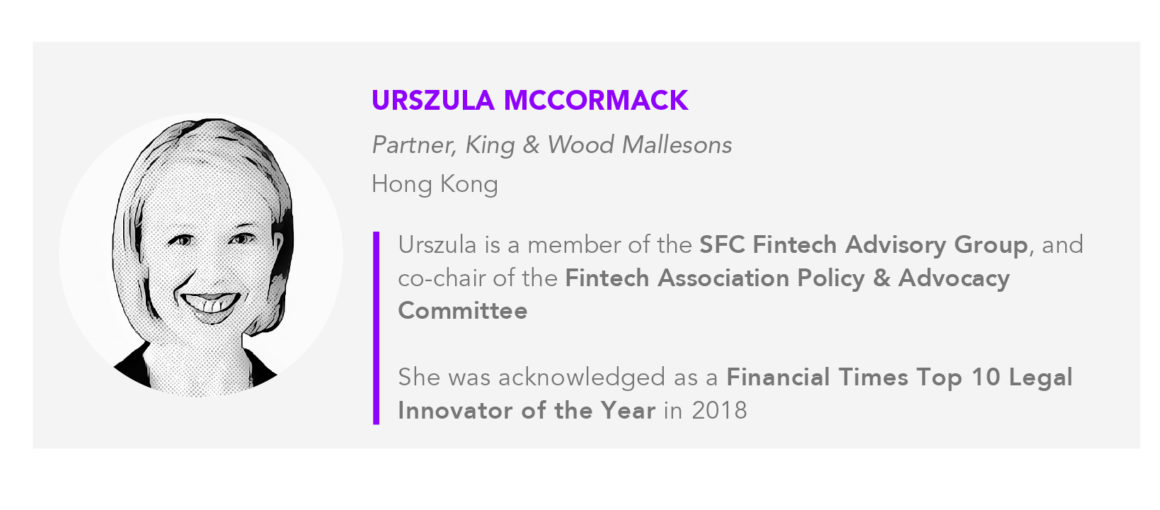Urszula McCormack of King & Wood Mallesons: data regulation will be a challenge for the virtual asset sector
In this edition of Forkast Forecasts, the financial regulatory lawyer and partner at King & Wood Mallesons offers her views on digital assets regulation, CBDCs and Asia’s digital transformation.
Welcome to Forkast Forecasts 2021. In this series, leaders, innovators and visionaries in blockchain-related fields tell Forkast.News what they see as the most noteworthy developments for this industry in 2020 and their predictions for the year ahead.
Urszula McCormack
Urszula McCormack is a financial regulatory lawyer at King & Wood Mallesons, an international law firm headquartered in Hong Kong.

McCormack is a partner in the firm’s banking & finance practice where she focuses on financial crime, data regulation, fintech and emerging technologies including blockchain. McCormack is a member of the SFC Fintech Advisory Group, co-chair of the Fintech Association of Hong Kong’s policy & advocacy committee and a member of the ASIFMA Fintech Working Group.
Biggest developments in 2020
- Greater regulatory clarity: “[Regulations are] starting to mature and have to keep pace with the recommendations that came through from the Financial Action Task Force. This basically means that each jurisdiction needs to make sure that at least it has controls for anti-money laundering and combating the financing of terrorism purposes.”
See related article: What are the SEC and OCC’s thoughts on digital asset regulations?
- Increased institutional engagement within the blockchain space: “[A] key trend over the last year has been the dawn of genuine large institutional engagement within the blockchain space, not just in the adoption of blockchain for things like trade, finance and countering invoice fraud, but really expanding their reach into blockchain applications, specifically into virtual assets. For some, that meant just engaging central bank digital currency (CBDC) projects. For others, that has involved actual experimentation with various solutions in order to be able to enable digital securities. So, Societe Generale’s a great example – first test case not only of a digital security, but also traded against a CBDC – the French CBDC in that case.”
See related article: Institutional investors blast bitcoin prices to new stratosphere
- The growth of decentralized finance (DeFi): “[There is so much going on around] DeFi and in what I would call ‘pseudo DeFi’ products – everything from lending, deposit products, you name it. Most of these products are actually centralized – and not really purely decentralized – but there is just so much interesting activity at that coalface that is difficult to regulate. I say that with some degree of trepidation, because of its scale, its capability and the difficulty that relates to both regulation and enforcement, particularly where you have proper decentralization.”
See related article: Why DeFi needs better KYC to curb money laundering
- The need for innovation in legal thinking and regulation to address risks: “You’re talking about potentially regulating code and code developers; code that could be used for multiple purposes – some which could be lawful, some which could not. It means very different philosophies around the regulation of code. Some people say code is speech and is therefore constitutionally protected, which is a very interesting area, particularly because it touches upon not just blockchain virtual assets, but also automation and smart contracts more generally. I think the more enlightened regulators see how these things are linked, and recognize the need to look at them altogether.”
See related article: SEC ‘Crypto Mom’ Hester Peirce: US will lose out in crypto innovations if regulations remain in limbo
Predictions for 2021
- The battle between transparency and privacy: “The biggest growth area in my practice has been data regulation, it now pervades almost every project. It’s my prediction that coming up ahead is where [regulation] will be the biggest challenge for the virtual asset sector, because of that collision between the drive for transparency and those fundamental interests of privacy.”
See related article: What the Twitter hack reveals about the need for digital identity security
- Big tech will be a major focus for regulators and institutions: “[Leading technology companies’] engagement in everything from payments through e-commerce, even the adoption of blockchain technology, will be under a huge spotlight, not just for regulators, but also incumbents. So, institutions – and this is often banks that are ready to engage in partnerships – may be rethinking their strategies around that, if their value proposition will be whittled away.”
- Digitalization of money and securities, and the role of cash: “We will see formal recognition of CBDCs. We’ll see them integrated into the financial system progressively. We already see the roll-out of mainland China’s DCEP project – that is a retail project. Most of the others are generally at a wholesale institutional level. What’s important about that is, yes, the innovation around money, it’s programmability and all the things that we can do with CBDCs. But the interesting point will be the ongoing role of cash, which goes back to both the privacy point and fundamental systemic risk considerations. Countries like Japan, Norway, even parts of the U.S. are reaffirming that they will continue to support cash.”
See related article: Hong Kong and now Australia heating up global digital currency race
- Asia’s digital transformation: “We focus a lot on Hong Kong and Singapore, but if you look at digital Thailand, Cambodia launching a CBDC or CBDC-like project, these economies are really looking to leapfrog traditional phases of development. So, they are presenting some really interesting opportunities for innovation – very focused on digitizing government, digitizing records, really embracing digital identity. So, I think watching what’s going on in the fabric of those jurisdictions will be something that is worth doing.”
See related article: Hong Kong’s Securities and Futures Commission’s new crypto rules will hinder opportunity